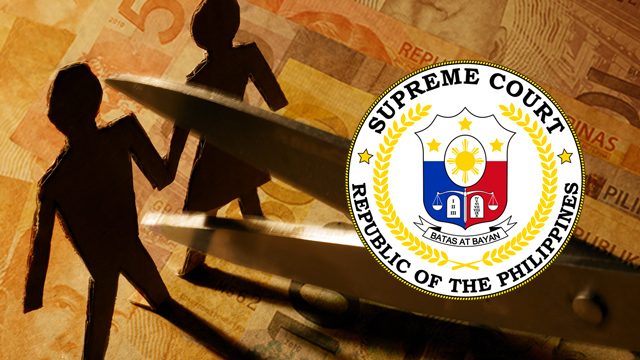SUMMARY
This is AI generated summarization, which may have errors. For context, always refer to the full article.

Editor’s note: An earlier version of this story used “annulment” instead of “declaration of nullity of marriage.” This has been corrected.
In a landmark ruling, the Supreme Court has modified the interpretation of psychological incapacity as a ground to annul a marriage, with discussions on how it will ease the requirements to end one of the most protected unions in predominantly Catholic Philippines.
“The Court in the case of Tan-Andal v. Andal, G.R. No. 196359, unanimously modified the interpretation of the requirements of psychological incapacity as a ground for declaration of nullity of marriage found in Article 36 of the Family Code,” the Supreme Court said in a press statement on Wednesday, May 12.
The decision was promulgated during the en banc session on Tuesday, May 11, and penned by Associate Justice Marvic Leonen, continuing his streak of decisions challenging conservative views on family.
Under Article 36 of the Family Code, a marriage is null and void if a spouse “was psychologically incapacitated to comply with the essential marital obligations of marriage…even if such incapacity becomes manifest only after its solemnization.”
The 1997 case, more popularly known as the Molina doctrine, laid out stringent requirements for this – psychological incapacity must be medically identified, proven to exist “at the time of celebration” of the marriage, and it must be so grave that marital obligations will not be fulfilled.
The new Leonen ruling said that “psychological incapacity is not a medical but a legal concept.”
Moreover, the ruling said: “It need not be a mental or personality disorder. It need not be a permanent and incurable condition. Therefore, the testimony of psychologist or psychiatrist is not mandatory in all cases. The totality of the evidence must show clear and convincing evidence to cause the declaration of nullity of marriage.”
The new ruling defines psychological incapacity as “a personal condition that prevents a spouse to comply with fundamental marital obligations only in relation to a specific partner that may exist at the time of the marriage but may have revealed through behavior subsequent to the ceremonies.”
On Twitter, there are discussions on how liberal the interpretation would become, and how lax the requirements can be to pass a judge. Some lawyers wondered if the Supreme Court just created jurisprudence akin to divorce.
Reporters have asked the SC’s Public Information Office for a full copy of the decision, but they have yet to receive it.
A bill that seeks to legalize absolute divorce in the Philippines hurdled the House committee on population and family relations in February 2020. House Bill (HB) No. 100, or the proposed Absolute Divorce Act, is authored by longtime advocate, Albay 1st District Representative Edcel Lagman.
The other grounds for nullity of marriage under Chapter 3 of the Family Code are the following: one of the spouses is underage; the spouses are siblings or ascendants/descendants of any degree; the marriage was solemnized by a person not authorized to perform marriage; or a case of mistaken identity.
This limitation of the Family Code has forced Filipinos to ascribe psychological incapacity to their spouses to annul their marriage.
This decision continues the High Court’s tackling of what could be described as progressive issues such as same-sex marriage and inheritance rights of “illegitimate” children. The same-sex marriage petitions have been junked, with justices tossing it to Congress, while the inheritance petition remains pending.
– Rappler.com
Add a comment
How does this make you feel?





There are no comments yet. Add your comment to start the conversation.